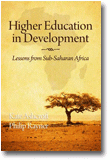
Higher Education in Development
Lessons from Sub Saharan Africa
By:
Kate Ashcroft, Emeritus Professor of the University of Wales Institute
Philip Rayner, Co-director Ashcroft and Rayner Consulting Ltd
Published 2011
This book will interest readers learning about or developing strategies for improving higher education systems and institutions in developing countries.
It provides an insight into sub-Saharan African higher education systems and sets out the ways that they are developing and changing. It explores the dilemmas inherent in a context of scarce resources with increasing and urgent demands for a more professionalized workforce and expert services. It examines the factors inhibiting development such as HIV/AIDS, gender issues, historical conflicts, cultural attitudes inimical to innovation, the challenges created by poor infrastructure, and the history of colonialism and authoritarianism and their legacy of centralized control and lack of autonomy and democracy.
The book explores lessons from research into sub-Saharan African higher education that may be applied to other contexts. The authors have lived and worked in sub-Saharan Africa and the book draws on the authors’ personal experience of higher education in Zambia, Ethiopia, The Yemen and their links in Mozambique and South Africa as well as extensive senior management experience and at the highest level within sub-Saharan higher education systems. It uses actual examples and a reflective ‘case study’ approach to describe reforms, and from these, develops ideas as to how to improve the effectiveness of higher education as a means to fight poverty.
The book explores lessons from research into sub-Saharan African higher education that may be applied to other contexts. The authors have lived and worked in sub-Saharan Africa and the book draws on their personal experience of higher education in Zambia, Ethiopia, The Yemen and their links in Mozambique and South Africa. The authors also use their extensive management experience at the highest level within sub-Saharan higher education systems. The book includes actual examples and a reflective ‘case study’ approach to describe reforms, and from these, develops ideas as to how to improve the effectiveness of higher education as a means to fight poverty.
CONTENTS
List of Acronyms 1 Introduction 2 The Context for Higher Education in
Sub-Saharan Africa 3 Managing Expansion 4 Structures and Systems 5
Leadership and Governance 6 Higher Education Management 7 Quality and
Standards 8 Developing a Curriculum 9 Teaching, Learning, and Student
Experience 10 Research and Community Service 11 Administrative Support
Structures 12 Conclusions Resources
REVIEWS
"This book is recommended for anyone in the field of comparative education interested in higher education in sub-Saharan Africa or other developing countries. Education development workers, especially those focused on finance, professional development, long-range planning, and research infrastructure would also benefit. Even those in the field working outside of the region can gain insight into the role they might play in terms of partnership and support of the region." Elizabeth R. Bruce Lehigh University in Forum for International Research in Education (Read full review)
-
Paperback978-1-61735-541-7
Web price: $45.04 (Reg. 52.99)
-
Hardcover978-1-61735-542-4
Web price: $80.74 (Reg. 94.99)
- eBook9781617355431

-
 (Re)Envisioning Social Studies Education Research
Current Epistemological and Methodological Expansions, Deconstructions, and Creations
(Re)Envisioning Social Studies Education Research
Current Epistemological and Methodological Expansions, Deconstructions, and Creations
-
 Affirming Identity, Advancing Belonging, and Amplifying Voice in Sororities and Fraternities
Affirming Identity, Advancing Belonging, and Amplifying Voice in Sororities and Fraternities
-
 Effective Alternative Assessment Practices in Higher Education
Effective Alternative Assessment Practices in Higher Education
-
 Expanding the Vision of Faculty Learning Communities in Higher Education
Emerging Opportunities for Faculty to Engage Each Other in Learning, Teaching, and Support
Expanding the Vision of Faculty Learning Communities in Higher Education
Emerging Opportunities for Faculty to Engage Each Other in Learning, Teaching, and Support
-
 Institutional Diversity in American Postsecondary Education
Institutional Diversity in American Postsecondary Education
-
 Promoting Equitable Classroom Practices in Higher Education
Approaches Beyond Curriculum
Promoting Equitable Classroom Practices in Higher Education
Approaches Beyond Curriculum
-
 The Handbook for Aspiring Higher Education Leaders
The Handbook for Aspiring Higher Education Leaders

